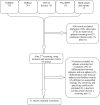Screening tests for aphasia in patients with stroke: a systematic review
- PMID: 27260296
- PMCID: PMC5306063
- DOI: 10.1007/s00415-016-8170-8
Screening tests for aphasia in patients with stroke: a systematic review
Abstract
Aphasia has a large impact on the quality of life and adds significantly to the costs of stroke care. Early recognition of aphasia in stroke patients is important for prognostication and well-timed treatment planning. We aimed to identify available screening tests for differentiating between aphasic and non-aphasic stroke patients, and to evaluate test accuracy, reliability, and feasibility. We searched PubMed, EMbase, Web of Science, and PsycINFO for published studies on screening tests aimed at assessing aphasia in stroke patients. The reference lists of the selected articles were scanned, and several experts were contacted to detect additional references. Of each screening test, we estimated the sensitivity, specificity, likelihood ratio of a positive test, likelihood ratio of a negative test, and diagnostic odds ratio (DOR), and rated the degree of bias of the validation method. We included ten studies evaluating eight screening tests. There was a large variation across studies regarding sample size, patient characteristics, and reference tests used for validation. Many papers failed to report on the consecutiveness of patient inclusion, time between aphasia onset and administration of the screening test, and blinding. Of the three studies that were rated as having an intermediate or low risk of bias, the DOR was highest for the Language Screening Test and ScreeLing. Several screening tools for aphasia in stroke are available, but many tests have not been verified properly. Methodologically sound validation studies of aphasia screening tests are needed to determine their usefulness in clinical practice.
Keywords: Aphasia; Cerebrovascular disease/stroke; Diagnostic test assessment; Infarction; Intracerebral hemorrhage; Screening test.
Conflict of interest statement
Compliance with ethical standards Conflicts of interest H El Hachioui received research support from the Netherlands Organization for Scientific Research (NWO) [Grant Number 017.002.083] and receives royalties from the publication of the test ScreeLing. W. M. E. van de Sandt-Koenderman and E. G. Visch-Brink receive royalties from the publication of the test ScreeLing. P. J. Koudstaal receives royalties from the publication of Textbook of Neurology. The other authors report no disclosures.
References
Publication types
MeSH terms
LinkOut - more resources
Full Text Sources
Other Literature Sources
Medical


